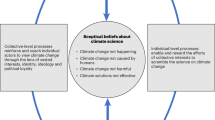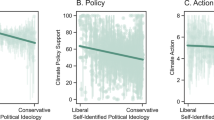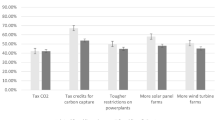Abstract
Of the climate science papers that take a position on the issue, 97% agree that climate change is caused by humans1, but less than half of the US population shares this belief2. This misalignment between scientific and public views has been attributed to a range of factors, including political attitudes, socio-economic status, moral values, levels of scientific understanding, and failure of scientific communication. The public is divided between climate change 'believers' (whose views align with those of the scientific community) and 'sceptics' (whose views are in disagreement with those of the scientific community). We propose that this division is best explained as a socio-political conflict between these opposing groups. Here we demonstrate that US believers and sceptics have distinct social identities, beliefs and emotional reactions that systematically predict their support for action to advance their respective positions. The key implication is that the divisions between sceptics and believers are unlikely to be overcome solely through communication and education strategies, and that interventions that increase angry opposition to action on climate change are especially problematic. Thus, strategies for building support for mitigation policies should go beyond attempts to improve the public’s understanding of science, to include approaches that transform intergroup relations.
This is a preview of subscription content, access via your institution
Access options
Subscribe to this journal
Receive 12 print issues and online access
$209.00 per year
only $17.42 per issue
Buy this article
- Purchase on Springer Link
- Instant access to full article PDF
Prices may be subject to local taxes which are calculated during checkout


Similar content being viewed by others
References
Cook, J. et al. Quantifying the consensus on anthropogenic global warming in the scientific literature. Environ. Res. Lett. 8, 1–7 (2013).
Middle East Publics Less Concerned about Climate Change than those in Other Nations (Pew Research Centre, 2013); http://www.pewresearch.org/fact-tank/2013/11/11/u-s-middle-east-less-concerned-about-climate-change-than-those-in-other-nations/
Survey Analysis Contradicts Common Climate Perception (Stanford Woods Institute for the Environment, 2013); https://woods.stanford.edu/news-events/news/survey-analysis-contradicts-common-climate-perceptions
Contestabile, M. Americans’ views. Nature Clim. Change 4, 86 (2014).
Whitmarsh, L. Scepticism and uncertainty about climate change: Dimensions, determinants and change overtime. Glob. Environ. Change 21, 690–700 (2011).
Feinberg, M. & Willer, R. The moral roots of environmental attitudes. Psychol. Sci. 24, 56–62 (2013).
McCright, A. M. & Dunlap, R. E. The politicization of climate change: Political polarization in the American public’s views of global warming. Sociol. Q. 52, 155–194 (2011).
Hoffman, A. J. The growing climate divide. Nature Clim. Change 1, 195–196 (2011).
Malka, A., Krosnick, J. A. & Langer, G. The association of knowledge with concern about global warming: Trusted information sources shape public thinking. Risk Anal. 29, 633–647 (2009).
Weber, E. U. & Stern, P. C. Public understanding of climate change in the United States. Am. Psychol. 66, 315–328 (2011).
Myers, T. A. et al. The relationship between personal experience and belief in the reality of global warming. Nature Clim. Change 3, 343–347 (2013).
Zaval, L. et al. How warm days increase belief in global warming. Nature Clim. Change 4, 143–147 (2014).
Brownstein, R. GOP gives climate science a cold shoulder. Nat. J. 42, 41–52 (2010).
Dunlap, R. E. & McCright, A. M. A widening gap: Republican and Democratic views on climate change. Environment 50, 26–35 (2008).
Jacques, P. J., Dunlap, R. E. & Freeman, M. The organisation of denial: Conservative think tanks and environmental scepticism. Environ. Pollut. 17, 349–385 (2008).
Brulle, R. J., Carmichael, J. & Jenkins, J. C. Shifting public opinion on climate change: An empirical assessment of factors influencing concern over climate change in the US, 2002–2010. Climatic Change 114, 169–188 (2012).
Moser, S. C. Communicating climate change: History, challenges, process and future directions. WIREs Clim. Change 1, 31–53 (2010).
Leiserowitz, A. et al. Global Warming’s Six Americas (Yale Project on Climate Change Communication, 2011).
McGarty, C. et al. Collective action as the material expression of opinion-based group membership. J. Soc. Issues 65, 839–857 (2009).
van Zomeren, M., Postmes, T. & Spears, R. Toward an integrative social identity model of collective action: A quantitative research synthesis of three socio-psychological perspectives. Psychol. Bull. 134, 504–535 (2008).
Thomas, E. F., McGarty, C. & Mavor, K. I. Aligning identities, emotions, and beliefs to create commitment to sustainable social and political action. Pers. Soc. Psychol. Rev. 13, 194–218 (2009).
Postmes, T., Rabinovich, A., Morton, T. & van Zomeren, M. in Encouraging Sustainable Behaviour (ed. van Trijp, H. C. M.) 185–202 (Psych. Press, 2014).
van Zomeren, M., Spears, R. & Leach, C. W. Experimental evidence for a dual pathway model analysis of coping with the climate crisis. J. Environ. Psychol. 30, 339–346 (2010).
Duncan, L. E. in The Oxford Handbook of Personality and Social Psychology (eds Deaux, K. & Snyder, M.) 781–803 (Oxford Univ. Press, 2012).
Haidt, J. The new synthesis in moral psychology. Science 316, 998–1002 (2007).
Koleva, S. et al. Tracing the threads: How five moral concerns (especially Purity) help explain culture war attitudes. J. Res. Pers. 46, 184–194 (2012).
Bulbulia, J., Osborne, D. & Sibley, C. G. Moral foundations predict religious orientations in New Zealand. PLoS ONE 8, e80224 (2013).
Poortinga, W. et al. Uncertain climate: An investigation into public scepticism about anthropogenic climate change. Glob. Environ. Change 21, 1015–1024 (2011).
McCright, A. M. Political orientation moderates Americans’ beliefs and concern about climate change. Climatic Change 104, 243–253 (2011).
Acknowledgements
We acknowledge support from the Australian Research Council through funding for the Discovery project ‘Pathways to social cohesion and social change: Opinion-based groups and the dynamic formation of identities’ (DP110100046, awarded to C.M. and A-M.B.) and Discovery Early Career Researcher Award (DE120101029) ‘Mass generosity as collective action’ (awarded to E.F.T.).
Author information
Authors and Affiliations
Contributions
A-M.B. and C.M. contributed to study design, statistical analyses and writing. E.F.T. contributed to study design and writing. G.L. contributed to study design, data management and writing. M.B. and R.M. contributed to interpreting the findings and writing. All authors commented on the paper and participated in the process of refinement of the paper in response to the peer reviews.
Corresponding author
Ethics declarations
Competing interests
The authors declare no competing financial interests.
Supplementary information
Rights and permissions
About this article
Cite this article
Bliuc, AM., McGarty, C., Thomas, E. et al. Public division about climate change rooted in conflicting socio-political identities. Nature Clim Change 5, 226–229 (2015). https://doi.org/10.1038/nclimate2507
Received:
Accepted:
Published:
Issue Date:
DOI: https://doi.org/10.1038/nclimate2507
This article is cited by
-
Strategic attitude expressions as identity performance and identity creation in interaction
Communications Psychology (2024)
-
Participating in a climate prediction market increases concern about global warming
Nature Climate Change (2023)
-
How do you feel about going green? Modelling environmental sentiments in a growing open economy
Journal of Economic Interaction and Coordination (2023)
-
Political ideology and psychological reactance: how serious should climate change be?
Climatic Change (2022)
-
‘It is a bloody big and responsible job’: perspectives on climate change communication from Australia-focused practitioners
Climate Action (2022)



